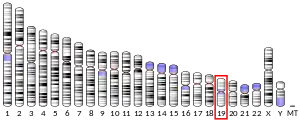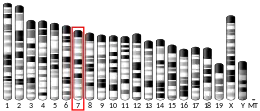SDHAF1
Succinate dehydrogenase complex assembly factor 1 (SDHAF1), also known as LYR motif-containing protein 8 (LYRM8), is a protein that in humans is encoded by the SDHAF1, or LYRM8, gene. SDHAF1 is a chaperone protein involved in the assembly of the succinate dehydrogenase (SDH) complex (complex II). Mutations in this gene are associated with SDH-defective infantile leukoencephalopathy and mitochondrial complex II deficiency.[5][6][7]
| SDHAF1 | |||||||||||||||||||||||||||||||||||||||||||||||||||
|---|---|---|---|---|---|---|---|---|---|---|---|---|---|---|---|---|---|---|---|---|---|---|---|---|---|---|---|---|---|---|---|---|---|---|---|---|---|---|---|---|---|---|---|---|---|---|---|---|---|---|---|
| Identifiers | |||||||||||||||||||||||||||||||||||||||||||||||||||
| Aliases | SDHAF1, LYRM8, succinate dehydrogenase complex assembly factor 1, MC2DN2 | ||||||||||||||||||||||||||||||||||||||||||||||||||
| External IDs | OMIM: 612848 MGI: 1915582 HomoloGene: 67970 GeneCards: SDHAF1 | ||||||||||||||||||||||||||||||||||||||||||||||||||
| |||||||||||||||||||||||||||||||||||||||||||||||||||
| |||||||||||||||||||||||||||||||||||||||||||||||||||
| |||||||||||||||||||||||||||||||||||||||||||||||||||
| |||||||||||||||||||||||||||||||||||||||||||||||||||
| |||||||||||||||||||||||||||||||||||||||||||||||||||
| Wikidata | |||||||||||||||||||||||||||||||||||||||||||||||||||
| |||||||||||||||||||||||||||||||||||||||||||||||||||
Structure
SDHAF1 is located on the q arm of chromosome 19 in position 13.12 and has 1 exon.[5] The SDHAF1 gene produces a 12.8 kDa protein composed of 115 amino acids.[8][9] SDHAF1 is ubiquitously expressed and belongs to the complex I LYR family and SDHAF1 subfamily.[6] As such, SDHAF1 is one of at least eight proteins that has a LYR tripeptide motif, thought to be important for Fe-S metabolism.[7] SDHAF1 also contains an N-terminal mitochondrial targeting sequence that does not get cleaved following import into the mitochondria. The encoded protein is fairly hydrophilic and does not contain a transmembrane domain.[10]
Function
SDHAF1 is essential for the assembly of the succinate dehydrogenase (SDH) complex (complex II), an enzyme complex that is a component of both the tricarboxylic acid (TCA) cycle and the mitochondrial electron transport chain, and which couples the oxidation of succinate to fumarate with the reduction of ubiquinone (coenzyme Q) to ubiquinol.[6] The succinate dehydrogenase (SDH) complex of the mitochondrial respiratory chain is composed of 4 individual subunits. The protein encoded by the SDHAF1 gene resides in the mitochondria, and is essential for SDH assembly, but does not physically associate with the complex in vivo.[5] Specifically, SDHAF1 mediates and promotes the maturation of the SDHB subunit of the SDH catalytic dimer. The iron-sulfur (Fe-S) protein subunit SDHB is required for functional succinate dehydrogenase. By protecting SDHB from damaging oxidants, SDHAF1 plays a vital role in the assembly and stability of succinate dehydrogenase (SDH).[11][10][6] Alternatively, SDHAF1 may facilitate Fe-S cluster acquisition by SDHB by directly binding to the co-chaperone HSC20, which is an essential component of the Fe-S biogenesis machinery that facilitates transfer of the Fe-S prosthetic group from the main scaffold protein ISCU to recipient apo-proteins (i.e. SDHB),[7]
Clinical Significance
Variants of SDHAF1 have been associated with mitochondrial complex II deficiency and infantile leukoencephalopathy. Mitochondrial complex II deficiency is a disorder of the mitochondrial respiratory chain with heterogeneous clinical manifestations. Clinical features include psychomotor regression in infants, poor growth with lack of speech development, severe spastic quadriplegia, dystonia, progressive leukoencephalopathy, muscle weakness, exercise intolerance, and cardiomyopathy. Some patients manifest Leigh syndrome or Kearns-Sayre syndrome. Missense mutations c.164 G > C, p.Arg55Pro and c.170 G > A, p.Gly57Glu, homozygous transversion 169G-C, p. Gly57-Arg, homozygous non sense mutation c.103G>T (p.Glu35X), and homozygous nonsense mutation c.22C > T, p.Gln8X have been associated with mitochondrial complex II deficiency due to SDHAF1 disfunction.[6][10][12][7]
Interactions
SDHAF1 has 27 protein-protein interactions with 15 of them being co-complex interactions. HSCB, SDHB, ccdc136, KRT27, CIDEB, HSPA9, and ISCU have all been found to interact with SDHAF1.[13][7]
References
- GRCh38: Ensembl release 89: ENSG00000205138 - Ensembl, May 2017
- GRCm38: Ensembl release 89: ENSMUSG00000074211 - Ensembl, May 2017
- "Human PubMed Reference:". National Center for Biotechnology Information, U.S. National Library of Medicine.
- "Mouse PubMed Reference:". National Center for Biotechnology Information, U.S. National Library of Medicine.
- "Entrez Gene: Succinate dehydrogenase complex assembly factor 1". Retrieved 2018-07-30.
- Universal protein resource accession number A6NFY7 for "SDHAF1" at UniProt. The UniProt Consortium (January 2017). "UniProt: the universal protein knowledgebase". Nucleic Acids Research. 45 (D1): D158–D169. doi:10.1093/nar/gkw1099. PMC 5210571. PMID 27899622.
- Maio N, Ghezzi D, Verrigni D, Rizza T, Bertini E, Martinelli D, Zeviani M, Singh A, Carrozzo R, Rouault TA (February 2016). "Disease-Causing SDHAF1 Mutations Impair Transfer of Fe-S Clusters to SDHB". Cell Metabolism. 23 (2): 292–302. doi:10.1016/j.cmet.2015.12.005. PMC 4749439. PMID 26749241.
- Zong NC, Li H, Li H, Lam MP, Jimenez RC, Kim CS, et al. (October 2013). "Integration of cardiac proteome biology and medicine by a specialized knowledgebase". Circulation Research. 113 (9): 1043–53. doi:10.1161/CIRCRESAHA.113.301151. PMC 4076475. PMID 23965338.
- Yao D. "Cardiac Organellar Protein Atlas Knowledgebase (COPaKB) —— Protein Information". amino.heartproteome.org. Retrieved 2018-07-30.
- Ghezzi D, Goffrini P, Uziel G, Horvath R, Klopstock T, Lochmüller H, D'Adamo P, Gasparini P, Strom TM, Prokisch H, Invernizzi F, Ferrero I, Zeviani M (June 2009). "SDHAF1, encoding a LYR complex-II specific assembly factor, is mutated in SDH-defective infantile leukoencephalopathy". Nature Genetics. 41 (6): 654–6. doi:10.1038/ng.378. PMID 19465911. S2CID 11595312.
- Na U, Yu W, Cox J, Bricker DK, Brockmann K, Rutter J, Thummel CS, Winge DR (August 2014). "The LYR factors SDHAF1 and SDHAF3 mediate maturation of the iron-sulfur subunit of succinate dehydrogenase". Cell Metabolism. 20 (2): 253–66. doi:10.1016/j.cmet.2014.05.014. PMC 4126850. PMID 24954417.
- Ohlenbusch A, Edvardson S, Skorpen J, Bjornstad A, Saada A, Elpeleg O, Gärtner J, Brockmann K (September 2012). "Leukoencephalopathy with accumulated succinate is indicative of SDHAF1 related complex II deficiency". Orphanet Journal of Rare Diseases. 7: 69. doi:10.1186/1750-1172-7-69. PMC 3492161. PMID 22995659.
- "27 binary interactions found for search term SDHAF1". IntAct Molecular Interaction Database. EMBL-EBI. Retrieved 2018-08-25.
Further reading
- Hoekstra AS, Bayley JP (May 2013). "The role of complex II in disease". Biochimica et Biophysica Acta (BBA) - Bioenergetics. 1827 (5): 543–51. doi:10.1016/j.bbabio.2012.11.005. PMID 23174333.
This article incorporates text from the United States National Library of Medicine, which is in the public domain.



